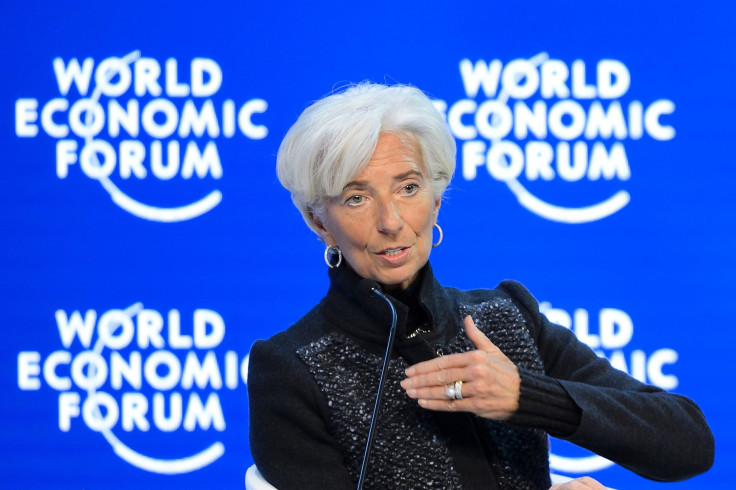IMF Chief Christine Lagarde Ramps Up Call For Global Action As Growth Risks Rise

The global economy's already modest prospects will decline further unless authorities take stronger action to boost growth, the head of the IMF warned Tuesday, saying the fund would cut its headline forecasts next week.
Christine Lagarde said China's shift to an economic model based more on domestic demand, stubbornly low commodity prices and tighter funding conditions in some countries had all clouded the outlook.
"Let me be clear: We are on alert, not alarm. There has been a loss of growth momentum," the International Monetary Fund's managing director said in a speech at Frankfurt, Germany's Goethe University.
The recovery from the 2007-09 global financial crisis "remains too slow, too fragile, and risks to its durability are increasing," Lagarde said.
But if policymakers confront the challenges and act together, "the positive effects on global confidence — and the global economy — will be substantial," she said.
Lagarde advised the United States to raise its minimum wage, Europe to improve job training and emerging economies to cut fuel subsidies and boost social spending.
She gave her strongest hint yet that the IMF will cut its global economic forecasts next week.
"The global outlook has weakened further over the last six months, so you can [deduce] from that there will be a slight revision [in the IMF estimates]," Lagarde said.
Lagarde's remarks come less than two weeks before ministers, central bankers and other policymakers from the fund's 188 member countries gather in Washington to assess the health of the world economy at the IMF and World Bank Spring Meetings.
While the U.S. recovery has been gaining momentum and some emerging markets, including Mexico, have performed well, the IMF views Europe and Japan as major disappointments, while China's slowing growth has hurt oil and commodity-exporting countries, including Brazil and Russia.
To counteract the headwinds, Lagarde called for accelerated structural reforms, increased fiscal support and continued accommodative monetary policy.
She urged improved tax incentives for research and development investments, citing IMF data showing that a 40 percent increase in R&D spending in advanced economies could yield a 5 percent increase in GDP over 20 years.
Asked about negotiations between the IMF, European lenders and Greece for a new bailout program for the heavily indebted country, Lagarde told Bloomberg TV the fund continues to negotiate "in good faith."
After internet site WikiLeaks published an apparent transcript of an IMF conference call, Lagarde denied that the fund's staff might threaten to pull out of the bailout as a negotiating tactic to force more European debt relief for Greece.
Introducing Lagarde's speech, Jens Weidmann, who sits on the European Central Bank's decision-making body and heads Germany's Bundesbank, said the IMF is "an essential component" in any eurozone rescue program.
Among other sources of uncertainty facing the global economy, Lagarde listed Britain's debate over remaining in the European Union.
© Copyright Thomson Reuters 2024. All rights reserved.





















